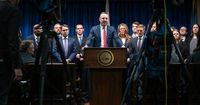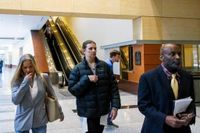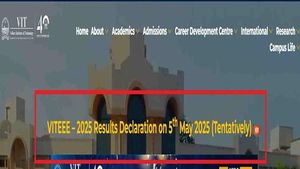A jury on March 19 found Aimee Bock guilty on all counts in connection with a fraud scheme that allegedly siphoned off $250 million in state funds intended for feeding children in Minnesota. This verdict brings to a head a case that has captivated public attention due to its scale and the serious implications of misusing pandemic relief resources.
Bock, 44, the founder of Feeding Our Future, faced a total of seven charges, including conspiracy, wire fraud, and federal program bribery. Her co-defendant, Salim Ahmed Said, a local restaurant owner, was also implicated in this vast fraud scheme. Said was found guilty on all 21 counts against him, which included wire fraud and money laundering. Reports indicate that Bock pocketed nearly $2 million, while Said took home around $5 million from the fraudulent operations.
Prosecutors highlighted that Bock and Said utilized the chaos of the pandemic to misrepresent the number of meals served to children, often submitting false documentation. They also underscored the attempted bribery of a juror and witness tampering to manipulate the judicial process during Bock’s trial.
Assistant U.S. Attorney Harry Jacobs described Bock’s actions during closing arguments, stating she sold a “perversion of the American dream” to vulnerable immigrants, particularly among the Somali community. Jacobs emphasized that while these immigrants aimed to provide better lives for their families, Bock exploited their good intentions for financial gain, encouraging illicit practices for profit.
Despite the overwhelming evidence, Bock's defense team argued that she was not involved in the fraud, maintaining her innocence throughout the trial. Her attorney, Kenneth Udoibok, claimed Bock was misled by her employees and consultants, many of whom spoke Somali and took advantage of her trust. Udoibok asserted that Bock rarely reviewed the inflated meal count forms that contributed to the fraud, suggesting she was not culpable for the deceptive practices.
Even so, as the trial progressed, prosecutors presented testimony from over 30 witnesses, reinforcing their contention that Bock ignored rising concerns about the fraudulent operations and engaged in deceptive practices herself. They painted a picture of a nonprofit leader who, rather than aiding children in need, was enriching herself at their expense.
On February 3, the federal trial commenced, drawing significant attention due to the stakes involved in a case outlined as one of the largest pandemic-related fraud investigations in the U.S. history. Of the 70 defendants initially charged since 2022, 37 have already pleaded guilty, and this trial represented a staggering example of how relief funds meant for vulnerable communities were misappropriated. This case did not just center around Bock; it reflected a broader system failure in the ad-hoc distribution of federal pandemic aid.
As the jury deliberated for only about five hours before reaching a verdict, legal experts suggested that the swift decision pointed to a strong case built by the prosecution. Assistant U.S. Attorney Joseph Thompson stated, “The fact that they returned a verdict so quickly speaks volumes to the job that our team did.” Bock, upon hearing the decision, appeared visibly distraught, as she cried and was comforted by her attorney before being led away in handcuffs along with Said.
The implications of this ruling extend beyond individual culpability; they signal a sobering reckoning with the systemic issues surrounding fraud in federally funded programs. With Bock’s attorney announcing plans to appeal the verdict, the case remains far from closed.
What’s more alarming is the larger context in which such fraud can occur. This case underscores a critical need to scrutinize how federal funds are allocated and monitored, especially in moments of crisis. As the nation continues to grapple with the aftermath of the pandemic, this case should serve as a beacon for legislative reform to prevent future exploitation.
Prosecutors have made it clear that they intend to hold all involved accountable. Given the scale of the fraud and the number of individuals implicated, further legal actions may follow. As Bock and Said await sentencing, which has yet to be scheduled, the case continues to cast a long shadow over Feeding Our Future and has instigated calls for more stringent oversight in federally funded programs designed to support the most vulnerable.








